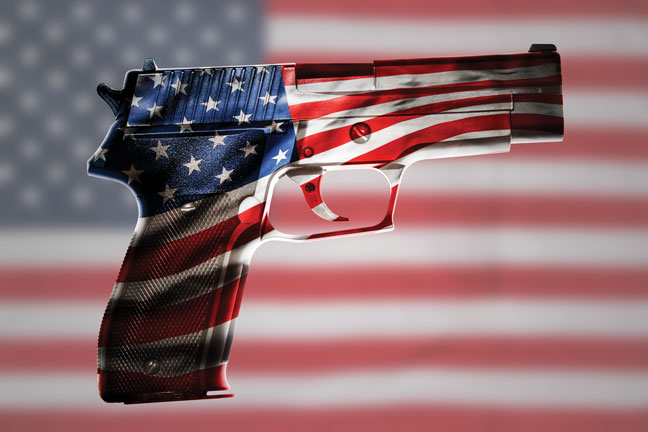To be fair, the United States does not have a monopoly on gun violence. There have been mass shootings in other countries, including Canada. But what the U.S. does have is a gun culture. The Second Amendment to the U.S. Constitution reads: “A well regulated militia, being necessary to the security of a free state, the right of the people to keep and bear arms, shall not be infringed.” At the time it was written, local militia protected people—their homes, farms and livelihoods.
Today, the well-meaning intention of a document from the 1700s is used to justify the right to own guns—a right fiercely defended by lobby groups such as the National Rifle Association (NRA)—even though weapons and society have changed.
I know the pushback: “Guns don't kill people. People kill people.” Or, “It's a sin problem, not a gun problem.” Is it a sin problem when a toddler finds a gun and accidentally kills herself or someone else? It has already happened more than 20 times this year. And almost 350 children under 11 have been shot or killed.
Another argument is: “The only thing that stops a bad guy with a gun is a good guy with a gun.” The chief of police in Dallas discredited this idea after the shooting in their city this past July, noting that in spite of the fact that several people near the area were exercising their right to “open carry,” five police officers were still shot and killed.
Others say that gun control won't work. Australia's example proves otherwise. In 1996, a gunman killed 35 people and wounded 23 others at a resort in Tasmania. Twelve days after the incident, then-Prime Minister John Howard introduced new gun laws, including a buy-back program, gun registration, prohibiting private sales and requiring buyers to present a “genuine reason” for needing a weapon. Since then, there have been no mass shootings.
As a Canadian, the political divisiveness and hostility surrounding this issue in the U.S. are mystifying; stronger gun regulations seem like common sense. Many Americans are just as frustrated.
A recent documentary by Abigail Disney examines gun culture in the U.S. and raises compelling questions. The Armor of Light focuses on Reverend Rob Schenck, a conservative evangelical who leads a ministry to politicians in Washington, D.C. A shooting in his neighbourhood causes him to advocate against gun violence, even though he loses donations and is worried about being branded a liberal.
The documentary captures the moment he meets Lucy McBath, whose unarmed 17-year-old son was shot and killed at a gas station in Florida in a dispute with a man over loud music. During their conversation, McBath says, “We're deceived into believing that we are so powerful because we have [guns] that will protect [us]. Instead of looking to God, righteously, as the protector, we have replaced God with guns.”
At another point in the film, Schenck says, “In respecting the Second Amendment, we must be careful we don't violate the second commandment.” Have guns become an idol? Can a Christian be pro-life and pro-gun?
After every mass shooting, people offer “thoughts and prayers” for the victims and their families. While we should pray, it's not enough. As the Apostle James wrote, “Can't you see that faith without good deeds is useless?” (James 2:20 NLT). We need stronger and better laws.
Tertullian, an early Christian author, wrote, “In disarming Peter, Christ disarmed all Christians.” Are we followers of “the Way” or “the gun”?
Captain Mark Braye is the corps officer at Sarnia Community Church, Ont.










As a U.S. Salvationist, I am saddened in reading this article knowing that other Salvationists around the world would suggest that our U.S. Constitutional Rights -- specifically a right that many of us believe to be the most significant thing standing between our freedom to preach the Gospel, and the Governments censorship of the Gospel -- are subject to your individual approval or the editorial responsibility of a foreign National publication. In what may be my own ignorance, I thought The Salvation Army maintained an official apolitical stance on non-Biblical issues. Furthermore, as a Salvationist the author may wish to rethink quoting Tertullian as his theology on the Trinity stands in direct opposition to our third and fourth Doctrines!